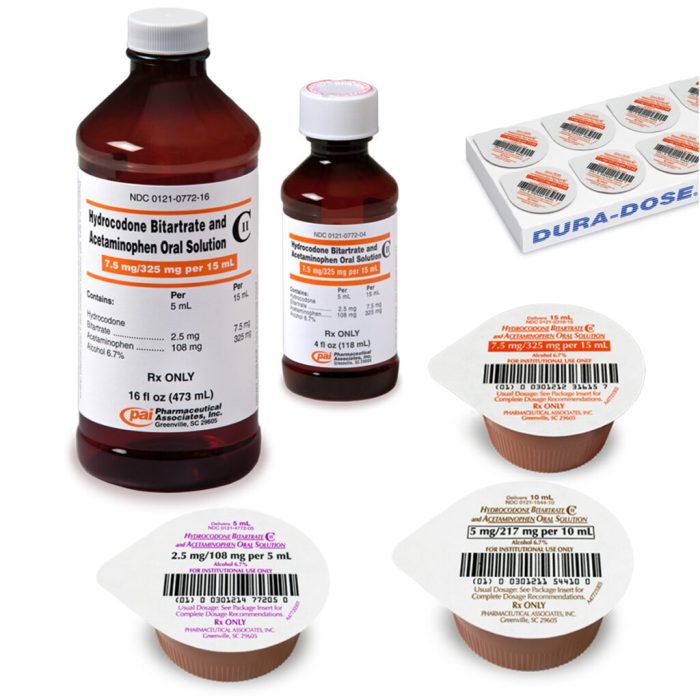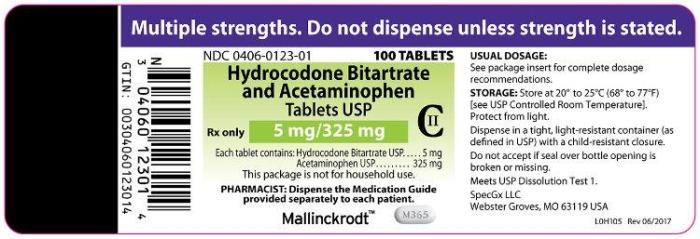Hydrocodone acetaminophen 5 325 español – Hydrocodone acetaminophen 5-325, a common pain reliever, is often prescribed for moderate to severe pain. This medication combines hydrocodone, an opioid, with acetaminophen, a non-opioid pain reliever, to provide effective pain relief. This guide provides essential information about hydrocodone acetaminophen 5-325, including its uses, dosage, potential side effects, and precautions, all translated into Spanish for easier understanding.
Hydrocodone acetaminophen 5-325 is available in various forms, such as tablets, capsules, and liquid solutions. The dosage and frequency of administration depend on the individual’s pain level and medical condition. It’s crucial to follow the prescribed dosage and seek medical advice if you experience any adverse effects. This medication can interact with other drugs and substances, so informing your healthcare provider about all medications you are taking is vital. Additionally, this guide discusses the importance of responsible use, including the risks of dependence and addiction with prolonged use.
Hydrocodone Acetaminophen 5-325

Hydrocodone acetaminophen 5-325 is a combination medication used to relieve moderate to severe pain. It contains hydrocodone, an opioid pain reliever, and acetaminophen, a non-opioid pain reliever. This medication is available by prescription only and should be used as directed by your doctor.
Understanding the Composition and Dosage
Hydrocodone acetaminophen 5-325 contains 5 milligrams of hydrocodone and 325 milligrams of acetaminophen in each tablet. The dosage of this medication will vary depending on the severity of your pain, your medical history, and other factors. Your doctor will determine the appropriate dosage for you.
Intended Use and Medical Conditions Treated
Hydrocodone acetaminophen 5-325 is used to relieve moderate to severe pain. It is commonly prescribed for pain caused by:
- Surgery
- Injury
- Chronic pain conditions
Potential Benefits and Risks
Benefits
- Effective pain relief
- Can help improve quality of life for those with chronic pain
Risks
Hydrocodone acetaminophen 5-325 can cause serious side effects, including:
- Addiction
- Overdose
- Respiratory depression
- Liver damage
- Constipation
- Nausea and vomiting
- Dizziness
- Headache
- Drowsiness
It is important to note that hydrocodone acetaminophen 5-325 can interact with other medications, including alcohol. It is crucial to inform your doctor about all medications you are taking, including over-the-counter medications and herbal supplements.
“Hydrocodone acetaminophen 5-325 should be used with caution in patients with a history of substance abuse, liver disease, or respiratory problems.”
Dosage and Administration

Hydrocodone acetaminophen 5-325 is a prescription medication used to relieve moderate to severe pain. It is important to take this medication exactly as prescribed by your doctor to avoid side effects and ensure it is effective.
Taking Hydrocodone Acetaminophen 5-325
It is important to follow your doctor’s instructions carefully when taking this medication. This includes taking the correct dosage, frequency, and duration of treatment.
- Dosage: The dosage of hydrocodone acetaminophen 5-325 will vary depending on your individual needs and the severity of your pain. Your doctor will determine the appropriate dosage for you.
- Frequency: You should take hydrocodone acetaminophen 5-325 as directed by your doctor. Do not take it more often or for longer than prescribed.
- Duration: It is important to take this medication for the prescribed duration. Do not stop taking it early, even if you feel better.
Storage, Hydrocodone acetaminophen 5 325 español
Storing your medication properly is crucial to maintain its effectiveness and prevent potential harm.
- Temperature: Keep hydrocodone acetaminophen 5-325 at room temperature, away from direct sunlight and moisture.
- Access: Store it in a safe place, out of reach of children and pets.
Disposal
Proper disposal of unused medication is essential for safety and environmental protection.
- Instructions: Follow your pharmacist’s instructions on how to dispose of unused hydrocodone acetaminophen 5-325.
- Do Not Flush: Never flush medication down the toilet or pour it down the drain unless instructed by your doctor or pharmacist.
- Take-Back Programs: Many pharmacies and community programs offer medication take-back programs. Contact your local pharmacy or health department for information on these programs.
Side Effects and Interactions
Hydrocodone acetaminophen 5-325, like any medication, can cause side effects. Understanding these potential effects and how they might interact with other medications is crucial for safe and effective use. It’s always important to consult a healthcare professional about any concerns or questions you may have regarding potential risks.
Common Side Effects
Common side effects of hydrocodone acetaminophen 5-325 include:
- Drowsiness
- Dizziness
- Headache
- Nausea
- Constipation
- Stomach upset
- Weakness
These side effects are generally mild and may subside as your body adjusts to the medication. However, if they persist or worsen, it’s essential to inform your doctor.
Interactions with Other Medications or Substances
Hydrocodone acetaminophen 5-325 can interact with other medications or substances, potentially leading to serious side effects. It’s crucial to inform your doctor about all medications, including over-the-counter drugs, vitamins, and herbal supplements, you are currently taking or have recently taken.
Some examples of potential interactions include:
- Alcohol: Combining alcohol with hydrocodone acetaminophen 5-325 can increase drowsiness, dizziness, and the risk of liver damage.
- Other pain relievers: Taking hydrocodone acetaminophen 5-325 with other pain relievers, such as ibuprofen or naproxen, can increase the risk of stomach bleeding or ulcers.
- Sedatives: Combining hydrocodone acetaminophen 5-325 with sedatives, such as benzodiazepines or muscle relaxants, can enhance drowsiness and respiratory depression.
- Antidepressants: Certain antidepressants, such as MAOIs, can interact with hydrocodone acetaminophen 5-325, potentially leading to serious side effects.
It’s vital to consult your doctor about any potential interactions before taking hydrocodone acetaminophen 5-325. They can advise you on the safest course of action and help you manage any potential risks.
Precautions and Warnings: Hydrocodone Acetaminophen 5 325 Español

Hydrocodone acetaminophen is a powerful medication that can cause serious side effects, especially if not used as directed. It’s crucial to be aware of the potential risks and to discuss them with your doctor before starting treatment. This section will Artikel important precautions and warnings related to hydrocodone acetaminophen use.
Precautions for Individuals with Specific Medical Conditions
Certain medical conditions can increase the risk of complications when using hydrocodone acetaminophen. It’s essential to inform your doctor about any pre-existing medical conditions, including:
- Asthma or respiratory problems: Hydrocodone can suppress breathing, which can be dangerous for individuals with asthma or other respiratory conditions.
- Liver disease: The liver metabolizes hydrocodone, and individuals with liver disease may be more susceptible to its side effects.
- Kidney disease: Hydrocodone is eliminated through the kidneys, and individuals with kidney disease may require dose adjustments.
- Head injury or increased intracranial pressure: Hydrocodone can increase pressure within the skull, which can be dangerous for individuals with head injuries or increased intracranial pressure.
- Prostate problems: Hydrocodone can worsen urinary retention, which can be a problem for individuals with prostate problems.
- Gastrointestinal problems: Hydrocodone can cause constipation, which can be a problem for individuals with gastrointestinal problems.
- Alcohol abuse: Combining hydrocodone with alcohol can increase the risk of side effects and overdose.
- Drug addiction: Individuals with a history of drug addiction may be more likely to develop dependence or addiction to hydrocodone.
Potential Risks During Pregnancy and Breastfeeding
Hydrocodone acetaminophen can be harmful to a developing fetus. It’s important to discuss the risks and benefits of using this medication with your doctor if you are pregnant or planning to become pregnant.
- Pregnancy: Hydrocodone can cross the placenta and may harm the developing fetus. It’s generally recommended to avoid using hydrocodone during pregnancy, especially in the first trimester.
- Breastfeeding: Hydrocodone can pass into breast milk and may harm a nursing infant. It’s generally recommended to avoid breastfeeding while using hydrocodone.
Potential for Dependence and Addiction with Long-Term Use
Hydrocodone is an opioid, and long-term use can lead to dependence and addiction. This means that your body can become accustomed to the medication, and you may experience withdrawal symptoms if you stop taking it abruptly. It’s important to use hydrocodone only as directed by your doctor and to avoid increasing the dose or taking it for longer than prescribed.
- Withdrawal symptoms: Withdrawal symptoms from hydrocodone can include anxiety, insomnia, sweating, muscle aches, and nausea.
- Tolerance: With long-term use, your body may develop tolerance to hydrocodone, meaning that you may need higher doses to achieve the same effect.
- Addiction: Addiction is a chronic disease characterized by compulsive drug seeking and use despite negative consequences.
Hydrocodone acetaminophen 5-325 can be a valuable tool for managing pain, but it’s crucial to understand its potential risks and benefits. This guide aims to provide comprehensive information to help patients make informed decisions about their pain management. Remember, always consult with a healthcare professional for personalized advice and to ensure the safe and effective use of this medication.
Hydrocodone acetaminophen 5 325 español is a common pain reliever, but it’s important to remember that it’s a prescription medication and should only be taken as directed by a doctor. Similarly, when treating your furry friend, always consult with your veterinarian before administering any medication, such as clavamox for dogs. While clavamox is a common antibiotic for dogs, it’s crucial to ensure the correct dosage and treatment plan for your pet’s specific needs.
Just as with hydrocodone acetaminophen 5 325 español, responsible pet ownership includes seeking professional advice before treating your dog.